1979 in the United States
| |||||
| Decades: |
| ||||
|---|---|---|---|---|---|
| See also: | |||||
Events from the year 1979 in the United States.
Incumbents
Federal government
- President: Jimmy Carter (D-Georgia)
- Vice President: Walter Mondale (D-Minnesota)
- Chief Justice: Warren E. Burger (Minnesota)
- Speaker of the House of Representatives: Tip O'Neill (D-Massachusetts)
- Senate Majority Leader: Robert Byrd (D-West Virginia)
- Congress: 95th (until January 3), 96th (starting January 3)
Events
January
- January 1 – The United States and the People's Republic of China establish full diplomatic relations.
- January 4 – The State of Ohio agrees to pay $675,000 to families of those who were dead or injured from the Kent State shootings.
- January 9 – The Music for UNICEF Concert is held at the United Nations General Assembly to raise money for UNICEF and promote the Year of the Child. It is broadcast the following day in the United States and around the world. Hosted by The Bee Gees, other performers include Donna Summer, ABBA, Rod Stewart and Earth, Wind & Fire. A soundtrack album is later released.
- January 19 – Former U.S. Attorney General John N. Mitchell is released on parole after 19 months at a federal prison in Alabama.
- January 21 – Super Bowl XIII: The Pittsburgh Steelers defeat the Dallas Cowboys 35–31 at the Miami Orange Bowl in Miami, Florida.
- January 29 – Brenda Ann Spencer opens fire at a school in San Diego, California, killing two faculty members and wounding eight students. Her response to the action, “I don’t like Mondays,” inspired the Boomtown Rats to make a song of the same name.
- January 1 to 31:
- Averaged over the contiguous United States, this is the coldest month since at least 1880 with a mean temperature of 21.90 °F or −5.61 °C as against an 1895 to 1974 mean of 29.99 °F or −1.12 °C.[1]
- The maximum temperature at 31.90 °F or −0.06 °C is also the coldest on record for any month and the only occasion when the area-averaged contiguous US mean maximum has fallen below freezing.[2]
February
- February 13 – The intense February 13, 1979 Windstorm strikes western Washington and sinks a 1/2-mile-long section of the Hood Canal Bridge.
- February 14 – In Kabul, Muslim extremists kidnap the American ambassador to Afghanistan, Adolph Dubs, who is later killed during a gunfight between his kidnappers and police.
- February 26 – A total solar eclipse occurred in North America.
- February 27 – The annual Mardi Gras celebration in New Orleans, Louisiana is canceled due to a strike called by the New Orleans Police Department.
- February 1 to 28 – With a statewide water-equivalent precipitation average of only 0.72 inches (18.3 mm), this is Alaska’s driest month since records began in 1925.[lower-alpha 1][3]
March
- March 4 – The U.S. Voyager I spaceprobe photos reveal Jupiter's rings.
- March 25 – The first fully functional space shuttle orbiter, Columbia, is delivered to the John F. Kennedy Space Center, to be prepared for its first launch.
- March 26 – In a ceremony at the White House, President Anwar Sadat of Egypt and Prime Minister Menachem Begin of Israel sign the Egyptian–Israeli Peace Treaty.
- March 29 – America's most serious nuclear power plant accident at Three Mile Island, Pennsylvania.
April

April 1: President Jimmy Carter leaving Three Mile Island for Middletown, Pennsylvania
- April 10 – A tornado hits Wichita Falls, Texas, killing 42.
- April 20 – President Jimmy Carter is attacked by a swamp rabbit while fishing in his hometown of Plains, Georgia.
- April 22 – The Albert Einstein Memorial is unveiled at The National Academy of Sciences in Washington, DC.
May
- May – The unemployment rate drops to 5.6%, the low point for the late 1970s business cycle and the lowest since July 1974.
- May 9 – A Unabomber bomb injures Northwestern University graduate student John Harris.
- May 21
- In San Francisco, gay people riot after hearing the verdict for Dan White, assassin of Mayor George Moscone and Supervisor Harvey Milk.
- The Montreal Canadiens defeat the New York Rangers 4 games to 1 in the best-of-seven series, winning the Stanley Cup.
- May 25
- American Airlines Flight 191: In Chicago, a DC-10 crashes during takeoff at O'Hare International Airport, killing 271 on board and 2 people on the ground.
- John Spenkelink is executed in Florida, in the first use of the electric chair in America after the reintroduction of death penalty in 1976.
- Six-year-old Etan Patz disappears in New York City. The incident helps spark the missing children's movement.
- May 27 – Indianapolis 500: Rick Mears wins the race for the first time, and car owner Roger Penske for the second time.
June
- June – McDonald's introduces the Happy Meal.
- June 1 – The Seattle SuperSonics win the NBA Championship against the Washington Bullets.
- June 18 – Jimmy Carter and Leonid Brezhnev sign the SALT II agreement in Vienna.
- June 20 – A Nicaraguan National Guard soldier kills ABC TV news correspondent Bill Stewart and his interpreter Juan Espinosa. Other members of the news crew capture the killing on tape.
July
- July 2 – The Susan B. Anthony dollar is introduced in the U.S.
- July 3 – U.S. President Jimmy Carter signs the first directive for secret aid to the opponents of the pro-Soviet regime in Kabul.
- July 8 – Los Angeles passes its gay and lesbian civil rights bill.
- July 11 – NASA's first orbiting space station Skylab begins its return to Earth, after being in orbit for 6 years and 2 months.
- July 12 – A Disco Demolition Night publicity stunt goes awry at Comiskey Park, forcing the Chicago White Sox to forfeit their game against the Detroit Tigers.
- July 17 – Nicaraguan dictator General Anastasio Somoza Debayle resigns and flees to Miami, Florida.
- July 19 – The Sandinista National Liberation Front concludes a successful revolutionary campaign against the U.S. backed Somoza dictatorship and assumes power in Nicaragua.
August
- August 2 - New York Yankees catcher and team captain Thurman Munson is killed in an airplane crash at age 32 during touch-and-go landings in Canton, Ohio while taking an off-day trip from the team.
- August 6 – The 5.7 Mw Coyote Lake earthquake affected the South Bay and Central Coast areas of California with a maximum Mercalli intensity of VII (Very strong), causing 16 injuries and $500,000 in damage.
- August 9 – Raymond Washington, co-founder of the Crips, today one of the largest, most notorious gangs in the United States, is shot and killed 5 months after his arrest for quadruple murder (his killers have not yet been identified).
- August 10 – Michael Jackson releases his first breakthrough album Off the Wall. It sells 7 million copies in the United States alone, making it a 7x platinum album.
- August 29 – A national referendum is held in which Somali voters approve a new liberal constitution, promulgated by President Siad Barre to placate the United States.
September
- September 1 – The U.S. Pioneer 11 becomes the first spacecraft to visit Saturn, when it passes the planet at a distance of 21,000 km.
- September 12 – Hurricane Frederic makes landfall at 10:00 p.m. on Alabama's Gulf Coast.
- September 16 – The Sugarhill Gang release Rapper's Delight, the first rap single to become a Top 40 hit on the Billboard Hot 100.
- September 23 – The largest anti-nuclear demonstration to date is held in New York City, when almost 200,000 people attend.[4]
October
- October 1–6 – Pope John Paul II visits the United States.
- October 14 – A major gay rights march in the United States takes place in Washington, D.C., involving many tens of thousands of people.
- October 15 – The 6.4 Mw Imperial Valley earthquake affected Southern California and northern Baja California with a maximum Mercalli intensity of IX (Violent), causing 91 injuries and $30 million in damage.
- October 17
- President Jimmy Carter signs a law establishing the Department of Education.
- 1979 World Series: The Pittsburgh Pirates defeat the Baltimore Orioles, 4 games to 3, to win their 5th World Series Title.
November
- November 1 – Iran hostage crisis: Iranian Ayatollah Ruhollah Khomeini urges his people to demonstrate on November 4 and to expand attacks on United States and Israeli interests.
- November 2 – Assata Shakur (ne' Joanne Chesimard), a former member of Black Panther Party and Black Liberation Army, is liberated from a Clinton, New Jersey prison and soon shuttled off to Cuba where she remains under political asylum.
- November 3 – Greensboro massacre in Greensboro, North Carolina, five members of the Communist Workers Party are shot to death and seven are wounded by a group of Klansmen and neo-Nazis, during a "Death to the Klan" rally.
- November 4 – Iran hostage crisis begins: 3,000 Iranian radicals, mostly students, invade the U.S. Embassy in Tehran and take 90 hostages (53 of whom are American). They demand that the United States send the former Shah of Iran back to stand trial.
- November 7 – U.S. Senator Ted Kennedy announces that he will challenge President Jimmy Carter for the 1980 Democratic presidential nomination.
- November 9 – Nuclear false alarm: the NORAD computers and the Alternate National Military Command Center in Fort Ritchie, Maryland detected purported massive Soviet nuclear strike. After reviewing the raw data from satellites and checking the early warning radars, the alert was cancelled.[5]
- November 12 – Iran hostage crisis: In response to the hostage situation in Tehran, U.S. President Jimmy Carter orders a halt to all oil imports into the United States from Iran.
- November 14 – Iran hostage crisis: U.S. President Jimmy Carter issues Executive Order 12170, freezing all Iranian assets in the United States and U.S. banks in response to the hostage crisis.
- November 17 – Iran hostage crisis: Iranian leader Ruhollah Khomeini orders the release of 13 female and African American hostages being held at the U.S. Embassy in Tehran.
- November 21 – After false radio reports from the Ayatollah Khomeini that the Americans had occupied the Grand Mosque in Mecca, the United States Embassy in Islamabad, Pakistan is attacked by a mob and set afire, killing 4 (see Foreign relations of Pakistan).
December
- December 3
- Eleven fans are killed during a stampede for seats before The Who concert at the Riverfront Coliseum in Cincinnati, Ohio.
- The United States dollar exchange rate with the Deutsche Mark falls to 1.7079 DM, the all-time low so far; this record is not broken until November 5, 1987.
- December 6 – The world premiere for Star Trek: The Motion Picture is held at the Smithsonian Institution in Washington, D.C.
- December 21 – Chrysler receives government loan guarantees upon the request of CEO Lee Iacocca.[6]
Undated
December 1, 1978 to February 28, 1979
- This is the coldest winter over the contiguous US since at least 1895 with a mean temperature of 26.61 °F or −2.99 °C as against an 1895/1896 to 1973/1974 seasonal mean of 31.94 °F or −0.03 °C.[7] Except for normally frigid upstate Maine, all of the United States was below average for the winter, an occurrence previously seen only in 1898/1899 and 1909/1910.[8]
- Both the contiguous US winter mean maximum temperature at 36.73 °F or 2.63 °C (1895/1896 to 1973/1974 mean 42.44 °F or 5.80 °C)[9] and the minimum temperature at 16.51 °F or −8.61 °C (1895/1896 to 1973/1974 mean 21.43 °F or −5.87 °C)[10] are the coldest since at least 1895
Ongoing
- Cold War (1947–1991)
- Détente (c. 1969–1979)
- 1970s energy crisis (1973–1980)
- Iran hostage crisis (1979–1981)
Births
- January 1 Ian Fowles Guitarist
- January 10 – Chris Smith, rapper in (Kriss Kross)
- January 15 – Drew Brees, football player
- January 16 – Aaliyah, R&B singer/actress (died 2001)
- January 24 – Tatyana Ali, actress
- January 26 – Natasha Cornett, criminal sentenced to life imprisonment for the Lillelid murders[11]
- January 29 – April Scott, model, actress, and producer
- February 4
- Ben Lerner, writer
- Tabitha Brown, actress
- February 11 – Brandy Norwood, singer and actress
- February 17 – Josh Willingham, baseball player
- February 21 – Jennifer Love Hewitt, actress and singer
- March 1 – Éowyn, singer-songwriter
- March 5 – Riki Lindhome, actress, comedian and musician
- March 11 – Benji Madden & Joel Madden, musicians (Good Charlotte)
- March 14 – Daniel Avidan, Musician/Youtuber
- March 18 – Adam Levine, singer (Maroon 5)
- March 30 – Norah Jones, musician
- April 4 – Natasha Lyonne, actress
- April 9 – Keshia Knight Pulliam, actress
- April 12
- Claire Danes, actress
- Jennifer Morrison, actress
- April 19 – Kate Hudson, actress, author and fashion designer
- May 4 – Lance Bass, singer ('N Sync)
- May 9
- Rosario Dawson, actress, singer, producer, comic book writer and political activist
- Matt Morris, American singer-songwriter and actor
- Brandon Webb, American baseball player
- Andrew W.K., singer-songwriter, producer, and actor
- May 12
- Andre Carter, American football player
- Steve Smith Sr., American football player
- May 23 – Matt Flynn, drummer (Maroon 5)
- June 8
- Rob Holliday, singer-songwriter and bass player
- Derek Trucks, guitarist and songwriter
- June 19 – Quentin Jammer, American football player
- June 21 – Chris Pratt, actor
- June 22 – Brad Hawpe, baseball player
- June 26 – Ryan Tedder, singer (OneRepublic)
- July 6 – Matthew Barnson, viola player and composer
- July 18 – Jason Weaver, American actor and singer
- July 21 – David Carr, American football player
- July 26 – Tamyra Gray, singer
- September 8 – Pink, singer
- September 16 – Flo Rida, rapper
- October 4 – Rachael Leigh Cook, actress
- October 10 – Mýa, singer and actress
- October 14 – Stacy Keibler, professional wrestler, actress and model
- November 7 – Jon Peter Lewis, singer-songwriter
- November 12 – Crown J, rapper
- November 15 – Brooks Bollinger, American football player and coach
- December 7
- Sara Bareilles, singer-songwriter and pianist
- Jennifer Carpenter, actress
- December 8 – Paul Dalio, filmmaker and mental health advocate
- December 12 – Garrett Atkins, baseball player
- December 11 – Rider Strong, actor
- December 17
- William Green, football player
- Matt Murley, hockey player
- December 18 Amy Grabow, actress
- December 22 Amanda Baker, actress
- December 23 Summer Altice, model and actress
- December 26 – Chris Daughtry, singer and guitarist
- December 27 Carson Palmer, football player
- December 31 Bob Bryar drummer (My Chemical Romance)
Deaths
January
- January 3 – Conrad Hilton, American hotelier (b. 1887)
- January 5
- Billy Bletcher, American actor (b. 1894)
- Charles Mingus, American musician (b. 1922)
- January 11 – Jack Soo, Japanese-born American actor (b. 1917)
- January 13 – Donny Hathaway, American musician (b. 1945)
- January 14 – Thomas DeSimone, American gangster (b. 1950)
- January 15 – Charles W. Morris, American philosopher and semiotician (b. 1901)
- January 16 – Ted Cassidy, American actor (b. 1932)
- January 26 – Nelson Rockefeller, 41st Vice President of the United States (b. 1908)
February
- February 2 – Sid Vicious, English musician (b. 1957)
- February 17 – William Gargan, American actor (b. 1905)
March
- March 1 – Dolores Costello, American actress (b. 1903)
- March 11 – Victor Kilian, American actor (b. 1891)
- March 18 – Marjorie Daw, American actress (b. 1902)
- March 22 – Ben Lyon, American actor (b. 1901)
- March 26 – Jean Stafford, American writer (b. 1915)
- March 28 – Emmett Kelly, clown (born 1898)
April
- April 4 – Edgar Buchanan, American actor (b. 1903)
- April 24 – John Carroll, American actor (b. 1906)
May
- May 6 – Milton Ager, American songwriter (b. 1893)
- May 8 – Talcott Parsons, American sociologist (b. 1902)
- May 11
- Joan Chandler, American actress (b. 1923)
- Barbara Hutton, American socialite (b. 1912)
- May 16 – A. Philip Randolph, African American labor union leader (b. 1889)
- May 29 – Mary Pickford, Canadian-American actress and producer (b. 1892)
June
- June 1 – Jack Mulhall, American actor (b. 1887)
- June 6 – Jack Haley, American actor (b. 1898)
- June 11
- Loren Murchison, American Olympic athlete (b. 1898)
- John Wayne, American actor and film director (b. 1907)
- June 13 – Darla Hood, American actress (b. 1931)
- June 25 – Dave Fleischer, American animator (b. 1894)
July
- July 4 – Theodora Kroeber, American writer and anthropologist (b. 1897)
- July 6 – Van McCoy, American accomplished musician; noted for his 1975 hit The Hustle (b. 1940)
- July 7 – Morris Talpalar, sociologist (b. 1900)
- July 8
- Elizabeth Ryan, American 30 Grand Slam (tennis) Tennis Champion (b. 1892)
- Robert Burns Woodward, American chemist, Nobel Prize laureate (b. 1917)
- July 10 – Arthur Fiedler, American conductor (Boston Pops) (b. 1894)
- July 12 – Minnie Riperton, American rhythm and blues singer (Lovin' You) (b. 1947)
- July 13 – Corinne Griffith, American actress and author (b. 1894)
- July 28 – George Seaton, American screenwriter and director (b. 1911)
- July 29 – Herbert Marcuse, German-American philosopher, sociologist and political theorist (b. 1898)
August
- August 2 – Thurman Munson, American baseball player (b. 1947)
- August 9 – Walter O'Malley, American baseball executive (b. 1903)
- August 10 – Dick Foran, American actor (b. 1910)
- August 21 – Stuart Heisler, American film and television director (b. 1896)
- August 22 – James T. Farrell, American novelist (b. 1904)
- August 25 – Stan Kenton, American jazz pianist (b. 1911)
- August 26 – Alvin Karpis, American criminal (b. 1907)
- August 30 (body found on September 8) – Jean Seberg, American actress (b. 1938)
- August 31 – Sally Rand, American dancer (b. 1904)
September
- September 1 – Doris Kenyon, American actress (b. 1897)
- September 24 – Carl Laemmle Jr., American film studio executive (b. 1908)
- September 26
- John Cromwell, American film director and actor (b. 1887)
- Arthur Hunnicutt, American actor (b. 1910)
- September 29 – Rudy Lavik, sports coach and administrator (b. 1892)
October
- October 1 – Dorothy Arzner, American film director (b. 1897)
- October 6 – Elizabeth Bishop, American poet (b. 1911)
- October 15 – Jacob L. Devers, U.S. Army general (b. 1887)
- October 27 – Charles Coughlin, Canadian-American priest (b. 1891)
November
- November 1 – Mamie Eisenhower, 34th First Lady of the United States (b. 1896)
- November 5 – Al Capp, American cartoonist (b. 1909)
- November 23 – Judee Sill, American singer and songwriter (b. 1944)
- November 30 – Zeppo Marx, American actor and comedian (b. 1901)
December
- December 7 – Cecilia Payne-Gaposchkin, British-born American astronomer and astrophysicist (b. 1900)
- December 9 – Fulton J. Sheen, American Roman Catholic bishop and venerable (b. 1895)
- December 10 – Ann Dvorak, actress (b. 1912)[12]
- December 13 – Jon Hall, American actor (b. 1915)
- December 15 – Ethel Lackie, American Olympic swimmer (b. 1907)
- December 16 – Murray Gurfein, judge of the Court of Appeals for the Second Circuit (b. 1907)
- December 22 – Darryl F. Zanuck, American film producer (b. 1902)
- December 23
- Peggy Guggenheim, American art collector (b. 1898)
- Ernest B. Schoedsack, American film producer and director (b. 1893)
- December 25
- Joan Blondell, American actress (b. 1906)
- Lee Bowman, American actor (b. 1914)
- December 30 – Richard Rodgers, American composer (b. 1902)
See also
Notes
- For comparison the contiguous US has had only one month drier than February 1979 in Alaska from coast to coast, namely October 1952 with only 0.54 inches or 13.7 millimetres.
References
- National Oceanic and Atmospheric Administration; Contiguous U.S. Average Temperature, January
- National Oceanic and Atmospheric Administration; Contiguous U.S. Maximum Temperature, January
- National Oceanic and Atmospheric Administration; Alaska Precipitation: February
- Herman, Robin (1979-09-24). "Nearly 200,000 Rally to Protest Nuclear Energy". The New York Times. p. B1.
- "NOVA Online - Russia's Nuclear Warriors - False Alarms on the Nuclear Front". www.pbs.org.
- "1.5 billion in aid OK'd for Chrysler". Chicago Tribune. December 21, 1979.
- National Oceanic and Atmospheric Administration; Contiguous US Average Temperature: December to February
- Wagner, A. James; ‘The Circulation and Weather of 1979 – Another Record Winter’; Weatherwise, 33(1) (January 1980); pp. 4-12
- National Oceanic and Atmospheric Administration; Contiguous US Maximum Temperature: December to February
- National Oceanic and Atmospheric Administration; Contiguous US Minimum Temperature: December to February
- Moorhouse, Frank (7 March 2019). "Satanic Killings". Allison & Busby – via Google Books.
- "Ann Dvorak". latimes.com. Retrieved 6 February 2020.
External links

This article is issued from Wikipedia. The text is licensed under Creative Commons - Attribution - Sharealike. Additional terms may apply for the media files.








